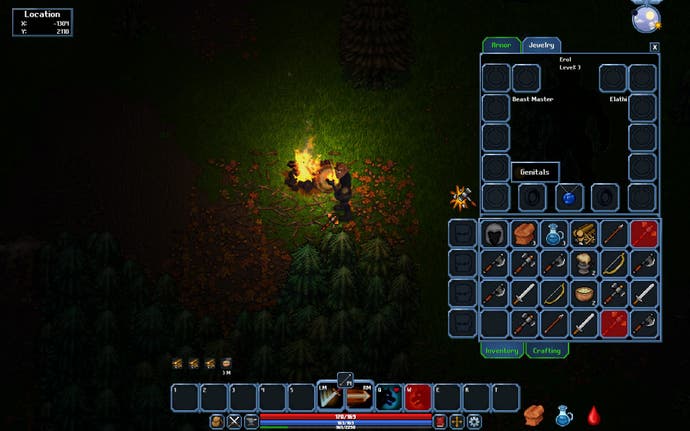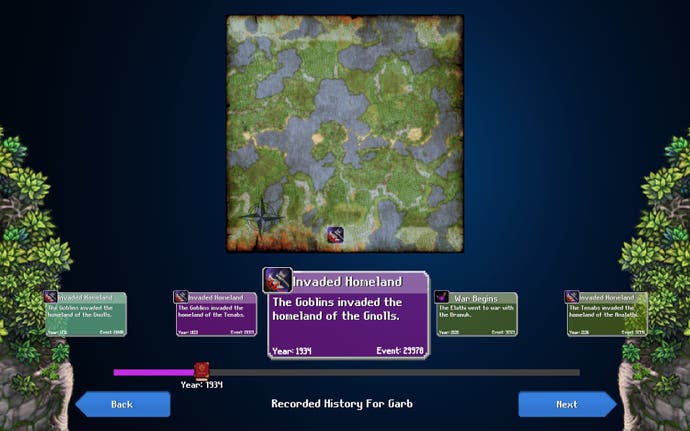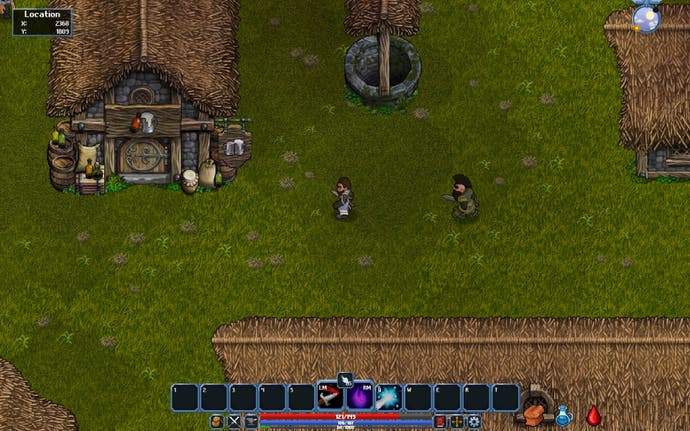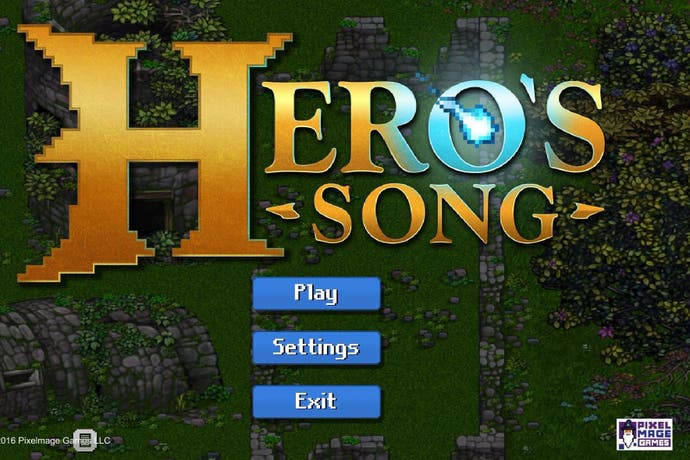The RPG with jewellery slots in unlikely places
What EverQuest's John Smedley did next.
I can safely say that in all my years playing fantasy video games I have never seen a jewellery slot for genitals. Nor have I ever considered that equipping something valuable down there may result in my willy being chopped off. Not a cheering thought, is it?
I didn't imagine I'd ever be talking quite so freely about cockrings while on the phone in the office either, especially not with John Smedley who made EverQuest happen. "Good!" he says when I tell him I'm getting funny looks. "That's what we want." But then it's his new game Hero's Song that I've been playing that's to blame, so...
"Things like +1 earring or +1 nosering or +1 dickring or whatever: we wanted to make it so that people could have these little trinkets and modify their character ever so slightly with all these different slots," he says. "We decided that it would be fun to do that.
"I look at it as an opportunity, because the cockring means you could maybe have your dick cut off. I want that!" he adds with frightening enthusiasm. "I have no idea [how it would work] but that is exactly what we want. We want just about anything to be able to happen to your character. That's why we went 2D instead of 3D, because we wanted to be able to make funny stuff happen and not have to worry about every single graphic effect in the world.
"We want to watch as your dwarf gets his leg cut off and then proceeds to have a peg-leg for the rest of his career!"
In a nutshell, 'scuse the pun, that's Hero's Song: a multiplayer fantasy game that doesn't look like much but has serious scope underneath. "I've always said that this game is a mixture of Dwarf Fortress, Terraria and Ultima Online," says Smedley, and those games don't look like much do they? But underneath! Underneath they are freedom, they are fear of other people, they are endless stories. He says, "This is the world I've been dreaming of making my entire gaming career."

But hold on a second, yes I did say John Smedley. The same John Smedley who made EverQuest happen and who ran Sony Online Entertainment and Daybreak Studios, turning out massively-multiplayer online games like Star Wars Galaxies, EverQuest 2, PlanetSide 1 and 2, H1Z1 and EverQuest Next - no sorry, not EQN because that was cancelled. But there are all the elephants in one sentence, so to speak, because whenever John Smedley is mentioned people show up because of those games with strong things to say about him.
"That comes with the territory," says Smedley. "I've been doing this for 30 years and over that time I have a lot of games that I've been involved with, that I'm super-proud of, and in each of those games there's always something that somebody can point to and go, 'Oh I wish he wouldn't have done that.' There's always a Star Wars Galaxies."
"[SWG] was so long ago now, and I actually said at the time, 'That was a mistake and I wouldn't do it twice.' I have to just... not ignore those things but... it just comes with the territory, and if people choose to not play something because of that: OK, I get it. But I'm super-proud of all the work I did on H1Z1 and EverQuest, and all these games that I built over a lifetime of making them, and if there's some haters out there then that's life; I really don't care."

Smedley stepped down as Daybreak CEO in summer 2015, and left the company shortly after. Several months later, EverQuest Next was cancelled.
"I read that like everybody else did and it came as a bummer to me. I was disappointed," he says, stressing that it really was a "surprise" for him. "But at some point companies have a finite amount of time and resources and they want to make the right decision based on those. I have no doubt there will be more EverQuest and I think they'll be just as great as the ones that came before them. Personally, I'm rooting for it, and I think people are going to see more EverQuest over time."
So why should you put your faith in John Smedley this time? Well, whatever you think about the games he made, they still got made, EverQuest Next being the exception, although that cancellation didn't happen on Smedley's watch. And heck, EverQuest wouldn't exist at all were it not for him; it was his idea.
"Oh ideas are nothing! They're the easy ones. It's just as simple as I was playing an online game at the time called CyberStrike ... and I never got into the MUD thing but I'd always wanted to make an online role-playing game, and after starting to play that I was able to convince my boss to give me the money to start it. EverQuest only cost four-and-a-half million dollars and it took us three years to make.
"I can't take credit for what EverQuest became, that really is Brad McQuaid, Steve Clover and the team. Mine was the ability to get it made - that's what I bring to the table, the ability to get s*** done, and spark the interest."
With his new studio Pixelmage and his new game Hero's Song, Smedley is trying to "get s*** done", albeit with 21 people rather than hundreds this time. There's a wealth of experience with him, not least Bill Trost, a key designer of EverQuest. (Brad McQuaid is now making the MMO Pantheon in case you're wondering.) Pixelmage is a studio of people experienced at shipping games, and Hero's Song doesn't represent wild, unchecked ambition. It's a game with a plan: a launch in March 2017, after six months in Early Access, no lingering around, and then a year of active development give or take, before moving onto a second, secretive game.
But Hero's Song isn't there yet. As it stands, after several hours play, it's basic and bare and a bit boring. A game that plays like a crude Diablo but nowhere near as much fun. A game that creates worlds and thousand-year histories on the spot; but histories so barely apparent they may as well not be there, and worlds so laborious to traverse that exploration is a chore rather than pleasure. A game with multiplayer servers so sparsely populated the chances of an encounter are slim to nonexistent. A game where content runs out quickly, crafting is exhausted, enemies and encounters repetitive and mundane. A game with no apparent direction, purpose and point. Even the permadeath is meek because you can escape your second-chance underworld prison rather easily. In short, Hero's Song doesn't add up to much.
The good news, in a roundabout way, is that Hero's Song is still missing so much that the vision, if you like, isn't visible. Smedley is also upfront about the state things are in. The map "sucks", he says, content wears thin "very quickly" and there's too much traipsing around. "The real problem isn't the running around, the real problem is there isn't enough interesting s*** to do while you're running around," he says. "It's an open-world game but only the basics are in there." Cashflow dictated an earlier than planned Early Access release, because, remember, Hero's Song failed to meet funding targets on both Kickstarter and Indiegogo earlier this year. So the intention is to update Hero's Song at "a massively fast pace", rolling in key features and soon.

The biggest things missing are a world that feels alive, with player housing and a properly connected history. The grand idea is for Hero's Song to simulate an AI world around you, where factions like elves and dwarves but also orcs and goblins vie for control. They will all have their own homes and daily routines, desires, rivalries and wars. "The orcs aren't just idly waiting for players to come by," Smedley says, "they actually want to conquer things. You will see the more evil civilisations actually start to make moves on the map and actually try to takeover towns."
Governing it all will be the history that's generated at the creation of your world. Who exists, where they are, how powerful they are, who they like, who they hate, which wars they have fought and which wars they have won. History writes the answers. It will even scatter magical relics around the world, created by people of legend, that you'll uncover by reading library books in towns - towns and libraries and books that history placed. History even governs your character's family lineage and the starting skills and abilities you have.
It's among that generated history and simulated world you will live, in a house you designed and built, Terraria style. It will be your safe haven, a place you can set up store and attract AI characters to, a place you can grow crops, craft - eke out an existence as viable as adventuring. But it can be attacked, both by other players and by things that go bump in the night. "We intend to make the night, and things that come out in it, a lot scarier," says Smedley. "We want to make your house much more than just a place to store your trophies; we want to make it the centre of your entire life in our game."
There's a questing system to come to provide context to what surrounds you. There are quick-travel wizard gates and druid stones, as well as horses and boats, on their way. There are caravans to find and protect in the wild - more things to find, more things to do. More everything. And multiplayer limits will be relaxed from 50 people to 200 soon, although they'll still need, you know, actual people to fill the worlds up.
Look past the ugly shell, then, and Hero's Song has promise, a lot more than I would have believed before sitting down to speak to John Smedley, frankly. But at the moment it's still mostly words, ideas that need to materialise. Like the cockrings. In theory Smedley has the experience and the team to do it, but whether he can, whether he can shake off the doubters and knit Hero's Song together successfully, remains to be seen. I hope so.


